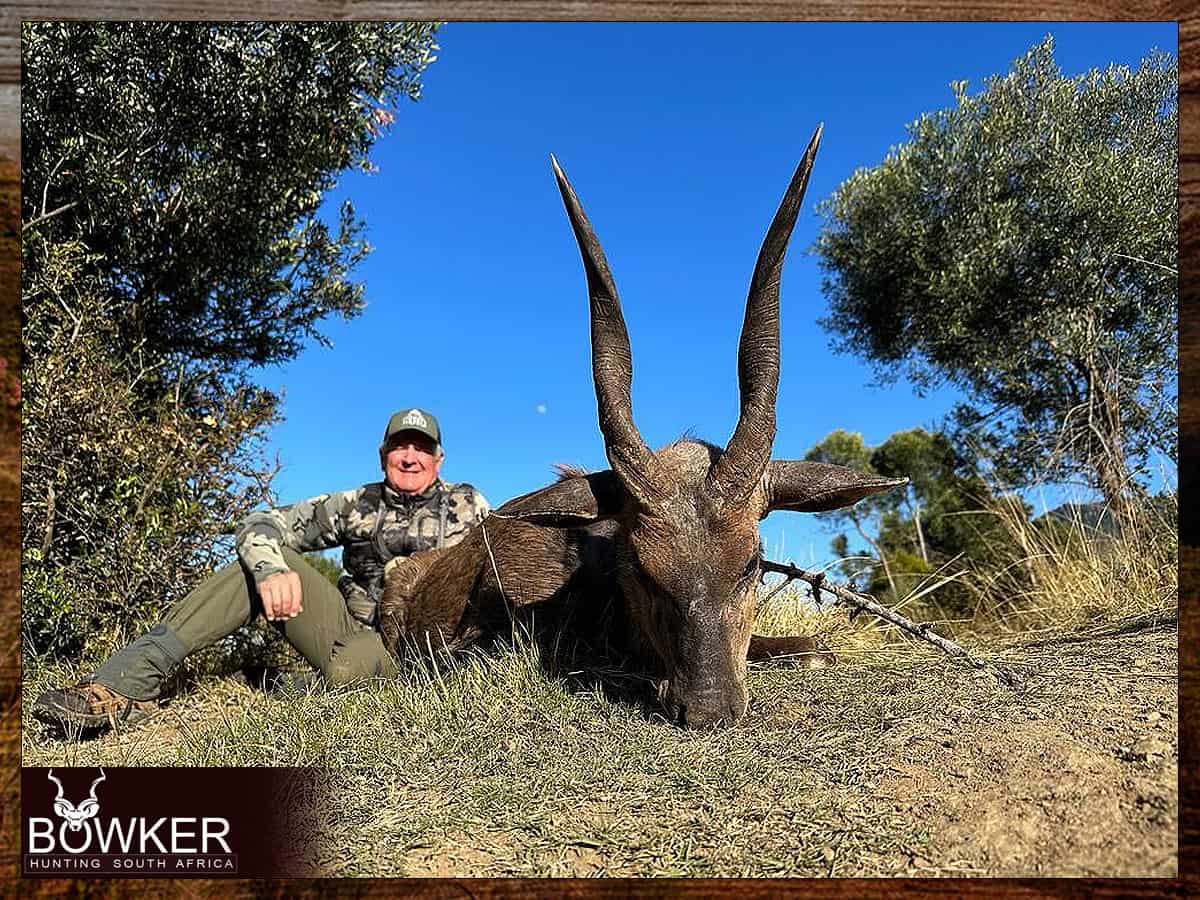A hunt in South Africa should be on all hunters’ bucket lists and will be an unforgettable experience. A South African hunting safari offers a wide variety of species in 9 different provinces.
Table of Contents
Introduction to Hunting in South Africa
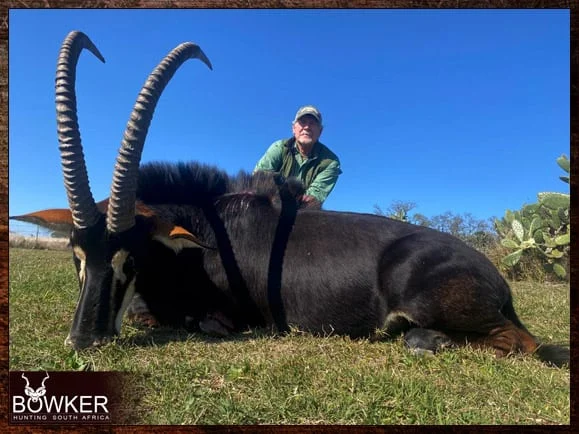
More than 50 species of game are on offer. The big five may also be hunted. South Africa has become the premier hunting destination in Africa and offers first-world hospitality and infrastructure.
Getting to South Africa is easy, and visitors from the United States or European Union do not require a visa. See our detailed planning and information guide for the first-time African hunter.
Hunting in South Africa is conducted “Safari Style,” where hunters drive around searching for plains game. When sighted, hunters stalk on foot. Alternatively, hunting is from an elevated vantage point, and a trophy is spotted in the thick brush and then stalked. Bow Hunting is from a hide overlooking watering points.
Why Hunt South Africa?
More than 10,000 hunters visit South Africa every year.
South Africa has an estimated 25 million head of game in the country versus the 1950s when less than half a million individuals were left.
A hunt in South Africa is more affordable, with a greater variety and number of animals than anywhere else.
Any big game hunter should visit South Africa at least once for an African safari. Hunters have various hunting packages and different hunting experiences to choose from.
Furthermore, superior infrastructure versus any other African country and inexpensive air travel make South Africa an unforgettable experience.
Visiting South Africa also provides a unique opportunity to see the Big Five and tour our famous National Parks.
In addition to the world-famous Kruger National Park, South Africa is home to nearly 150 other National Parks and reserves, including those dedicated to nature, marine life, forestry, botany, and other unique interests.
South Africa shares a special place in the hearts and minds of hunters and non-hunters.
Getting to South Africa

First-world airports and easily affordable travel make South Africa a convenient and trouble-free hunting destination. There are daily flights between the US and Europe and South Africa.
Although relatively long, the flights are very affordable and comfortable. Johannesburg is the gateway to Africa and is where most international flights land.
Delta and United now have direct flights from the United States to Capetown, where you can catch a domestic flight.
There are both direct flight options, and if you prefer to break the flight up, there are options through Europe or the Middle East from the United States.
Only Airlink will fly your guns inside South Africa. This is very important when booking your flights. Your connecting flight from Johannesburg to Port Elizabeth (Now called Gqeberha) should be Airlink if you carry rifles.
With internet search websites booking flights has never been easier. Others may prefer the security of a professional to book their flights and assist with all travel plans.
We would suggest a specialized hunting travel agent such as Gracy Travel. Getting to and from South Africa should not cost more than $1500 to $2500.
Reference: Jerome Philippe – AfricaHunting.com
Where can I Hunt in South Africa?
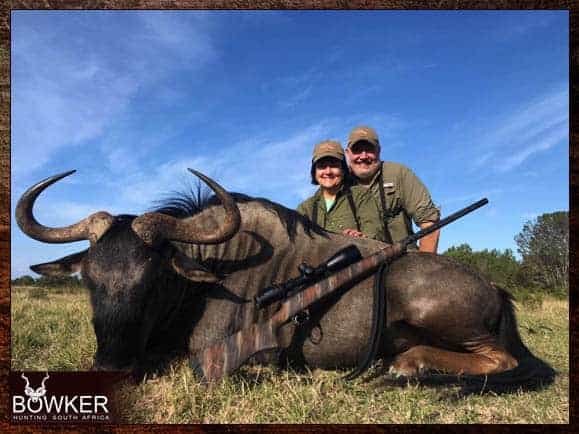
South Africa has nine provinces, and hunting is readily available in all nine provinces. Click on a province to get a more detailed overview.
The provinces are:
- Eastern Cape.
- Limpopo
- Free State
- Northern Cape
- Gauteng
- Mpumalanga
- KwaZulu-natal
- North West
- Western Cape
Do I Need a License to Hunt South Africa?
Do I need a license to hunt in South Africa?
Laws in South Africa allow anyone who is not a South African citizen to hunt.
However, the client must be supervised by a licensed professional hunter. A licensed professional outfitter must host the hunt.
Is it legal to hunt in South Africa?
Yes, it is legal to hunt in South Afria.
Rifles Considerations
Should I bring my rifle or rent a rifle in South Africa?
If bringing your rifle is not a must. We suggest using the outfitter’s rifles. Using the outfitter’s rifles will simplify planning your African hunting safari.
For many bringing their rifle is a must. Getting hunting firearms to South Africa is relatively easy, even for a first-time African hunter.
Thousands of hunters bring firearms into South Africa every year. However, you do need to be prepared.
When traveling with weapons, it is advisable to use the service of an agent in Johannesburg. Gracey Travel will make travel arrangements and see to the paperwork for your rifle import permit.
What is the best rifle for hunting plains game in South Africa?
The best rifles are the flat shooting 7mm calibers or 300 Winchester magnums. The 30.06 is just fine, or for that matter, your trusted deer rifle will do the job.
What rifle should I use in South Africa for hunting dangerous game?
The minimum legal requirement for hunting dangerous game is a .375 caliber.
Shooting sticks
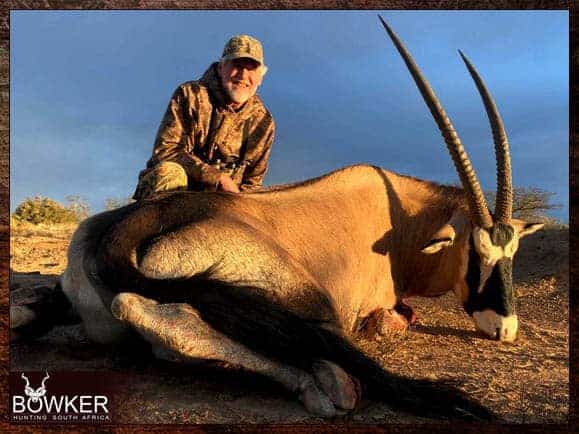
Should I practice with shooting sticks before my South African hunting safari?
Absolutely. Hunting with shooting sticks is universal in Africa and essential for planning your South African hunting safari. This is because most hunting in Africa is from a standing position.
Should I take a range finder to South Africa?
Your guide will almost certainly have range-finding capability in his binoculars. The guide will give you the precise distance before taking the shot. If you have a rangefinder, you should take it with you.
Is it Safe to Hunt in South Africa?
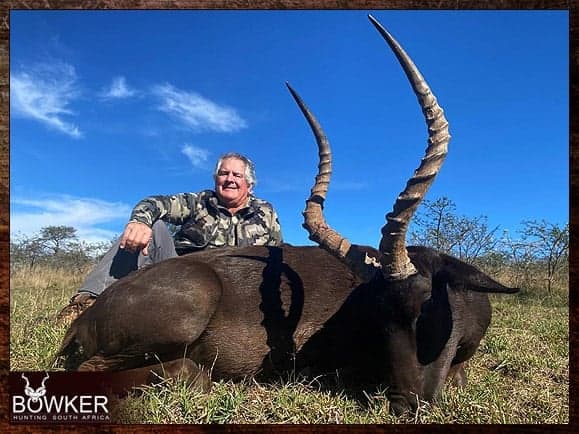
Is South Africa a safe country for hunting?
South Africa is considered a safe country to hunt. You will be picked up at the airport by your guide. He will accompany you throughout your safari.
Your guide will know where to go and not go. In addition, you will be hunting in remote areas.
What inoculations do I need for South Africa?
The CDC recommends the following inoculations or preventative medications:
1. Malaria for limited areas in South Africa.
2. Rabies vaccination.
3. Hepatitis A & B
4. Typhoid
5. Tetanus or tetanus booster.
Do I need a yellow fever vaccination for South Africa?
You do not need a yellow fever vaccination.
Are venomous snakes a risk on a South African hunting Safari?
Hunters being bitten by snakes is almost unheard of. Your guide and tracker will be leading the way. They will know what to do if you encounter any snakes.
However, South Africa has some highly venomous snakes, including the cobra, black mamba, and puff adder.
Health Insurance
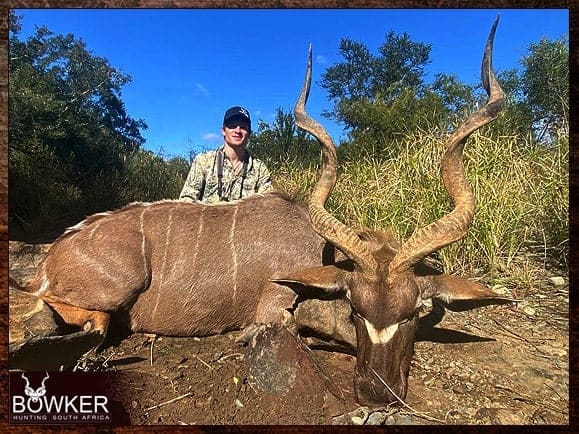
What happens if I have a health issue and need a doctor while hunting in South Africa?
South Africa has excellent private medical care. Your outfitter and guide will know where the best doctor and hospitals are to be found.
Will my medical insurance cover me during my South African hunting trip?
Check this with your health insurance provider and ensure you have coverage. You may consider buying an evacuation policy from a company such as Global Rescue. This will ensure you are medically evacuated back to the United States.
Can I take my prescription medications on my South African hunting safari?
Yes, you can. Prescription medication must be transported in its original packaging.
Temperature and Weather
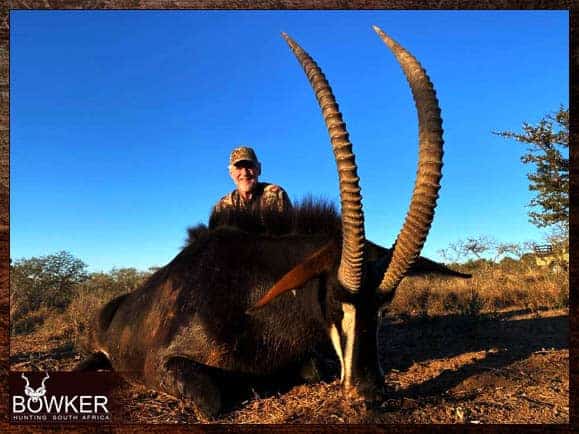
South Africa has a warm, moderate, and dry climate, which is ideal for big game hunting.
Seasons
- Summer – December through February
- Fall – March through May
- Winter – June through August
- Spring – September through November
Temperature
During the winter months, expect around 65°F – 75°F. In the fall and spring, temperatures range between 70°F and 80°F. Summer months are hot at around 80°F – 95°F.
Temperatures do vary depending on where you are in South Africa. Click on the province you will be hunting in to get more detailed information.
- Eastern Cape.
- Limpopo
- Free State
- Northern Cape
- Gauteng
- Mpumalanga
- KwaZulu-natal
- North West
- Western Cape
When is the Best time to Hunt in South Africa?
When is the best time for hunting in South Africa?
March through October is the best time to hunt. The weather is cooler during this period.
Food and Drinking Water
Is the drinking water safe in South Africa?
Outfitters will provide bottled water. In addition, the water at lodges is from a borehole which is also safe.
Avoid drinking water from dams and rivers. Only drink bottled water when in transit at the major centers.
What will I drink while hunting?
Your guide will carry your preferred drinks while out in the field.
Will I eat the animals I shoot on my safari?
Yes, you will be served a lot of venison. Local outfitters pride themselves in a variety of game dishes.
What sort of food can I expect while on my hunting safari?
The food will be very similar to that served in the United States. In addition, you can request any dishes within reason. Many outfitters will ask about your dietary requirements ahead of time.
What beverages can I expect around the dinner table?
Local wines and beers are of excellent quality. and similar to that of the United States. The outfitter will enquire as to your preferred evening beverages.
Clothing for Your African Safari
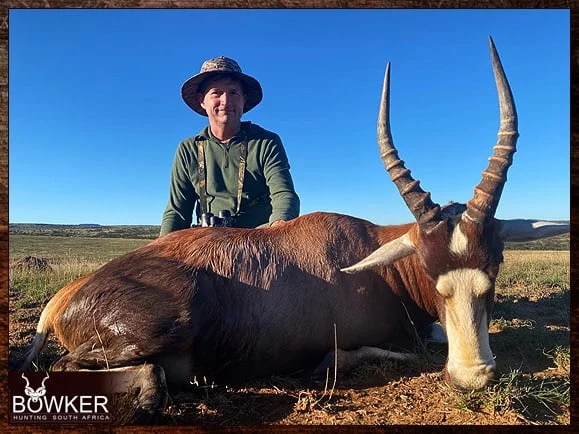
Can I wear camouflage clothing in South Africa?
There are no restrictions on camouflage clothing in South Africa. The camouflage used in the United States works well in South Africa.
What clothes should I bring on my hunting safari in South Africa?
Outfitters will ensure washing is done daily. Don’t overpack. Here is a suggested list:
Two pairs of hiking boots
Three hunting shirts (earth color)
Two long hunting pants
One warm jacket
One raincoat
One pullover
Casual outfit for the camp
Loafers
Sleepwear
Cap or sun hat
What are the best colors for hunting clothes in South Africa?
Bright colors should be avoided. Earth colors, including khaki, brown, and camouflage, are all fine. Olive green is considered the best color by many South African professional hunters.
Travel and Visa requirements for South Africa
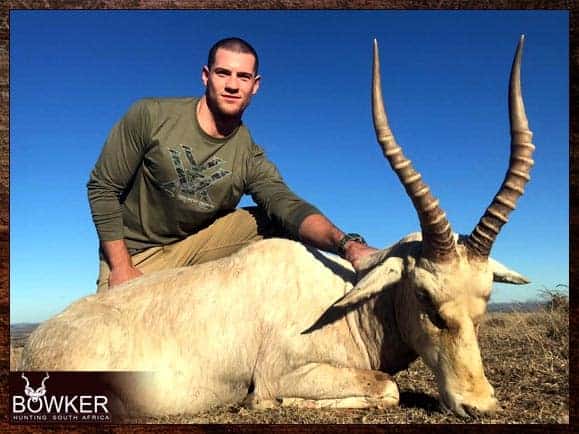
Do I need a visa to travel to South Africa?
If you hold a US, EU, or Canadian passport, you do not need a passport to travel to South Africa for hunting.
How many blank pages must I have in my passport to travel to South Africa?
A minimum of two blank pages are required.
Are there special requirements for traveling with children?
The traveling with one parent requirements has been dropped. However, valid passports are required. Always check this with your outfitter and or travel agent.
Should I overnight in Johannesburg before catching my domestic flight?
Yes, most outfitters will recommend this. This will allow you to rest and relax after a long flight. Try City Lodge, which is a two minutes walk from the airport.
Taxidermy
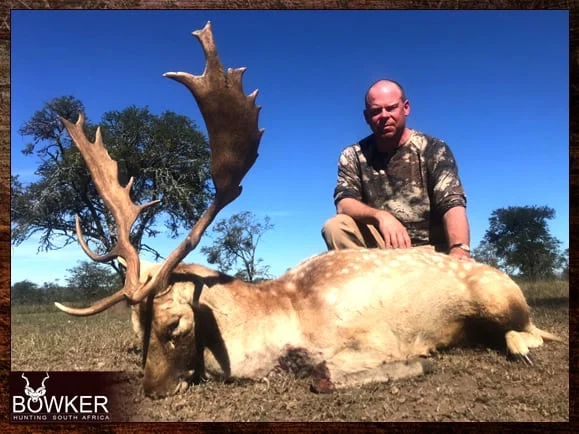
Should I have my taxidermy done in South Africa or the United States?
Taxidermy costs will be considerably cheaper in South Africa. In addition, South African taxidermists specialize in African trophies.
Who will ensure the taxidermy is done according to my specifications?
Your outfitter will be responsible. He will enquire about the type of mount you require and ensure the skinner’s cape accordingly. In addition, your outfitter will ensure pick up by the taxidermist.
How does payment work for my taxidermy in South Africa?
The South African taxidermist will contact you directly and confirm your requirements. He will also ask for a 50% downpayment.
Once received he will begin work. At completion, before shipping, he will ask for the final payment.
Which taxidermist should I use in South Africa?
Your outfitter will have a recommended taxidermist. Using your outfitter’s taxidermist provides comfort as you have an existing relationship.
He will be able to help if there are problems. You can always do a price check.
Shipping and custom clearance
Who will arrange shipment to the United States, and how much will it cost?
The taxidermist will arrange shipment. The cost will depend on the volume of the crate and its weight.
In addition, the price will be impacted by choice of sea freight or air freight. The former will take much longer. The taxidermist will give you the cost of freight alternatives.
Should I use an agent to clear customs, and which US clearing agent (customs broker) should I use?
Yes. The clearing agent will be familiar with the process for clearing US customs.
Your taxidermist will have a US clearing agent, or you can choose your agent.
Tipping
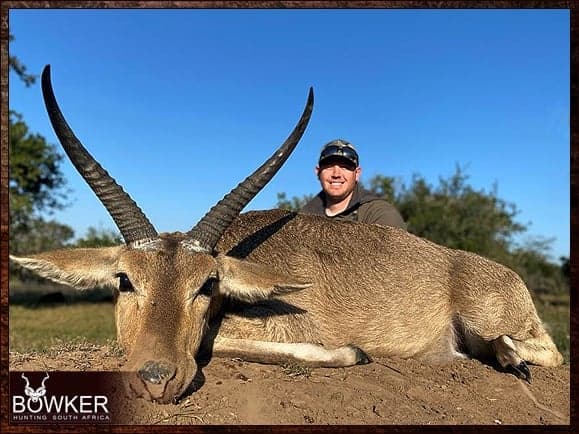
How much should I tip on a South African hunting Safari?
Guide (professional hunter in South Africa). $100 – $200 per day. The guide is responsible for your well-being and ensuring you get your target trophies and are comfortable in the hunt lodge.
Tracker and skinner. $100 – $200 in total each.
Camp staff. $100 – $200 in total to be split.
Hunting Information by Area
Eastern Cape
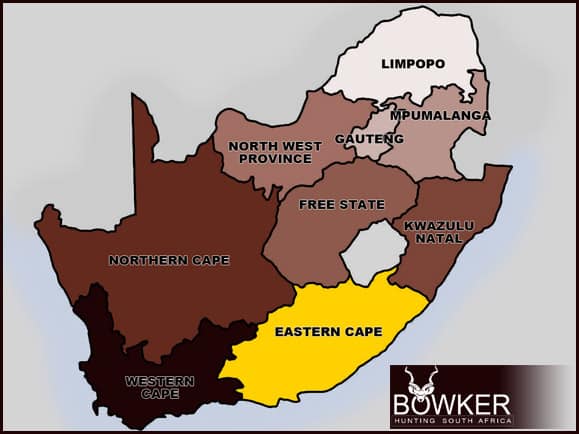
Landscape
The Eastern Cape boasts the second-largest number of outfitters and has a unique topography. The Karoo in the northern part of the province is arid with vast plains.
As you move south into higher rainfall areas, the topography changes to semi-wooded areas and valley bushveld. The vast diversity of habitat results in a broad range of plains game animals versus some other provinces. Many species have been reintroduced and bred.
Eastern Cape hunting
The uniqueness of hunting in the Eastern Cape is the number of different species that can be taken or seen on any day. Specialist animals include the Eastern Cape kudu, slightly shorter in horn length than its Northern cousin.
Caracal hunting and bushpig hunting with hounds is also an Eastern Cape specialty, along with hunting rhinos using a Vito dart. Other specialties include the mountain zebra, grey rhebok, and cape grysbok.
Shooting distances tend to be longer and around two or three hundred yards.
Getting to the Eastern Cape.
Hunters will typically arrive at Johannesburg international airport (OR Tambo international) and then take a short domestic flight to Port Elizabeth or East London, where their outfitter will me them at the airport and drive them to their designated hunting area. Typically around a two-hour drive.
Delta and United now have direct flights from the United States to Capetown, where you can catch a domestic flight.
Best game park viewing
The Eastern Cape boasts some big five game parks, such as the Addo Elephant Park, as well as a magnificent unique coastline.
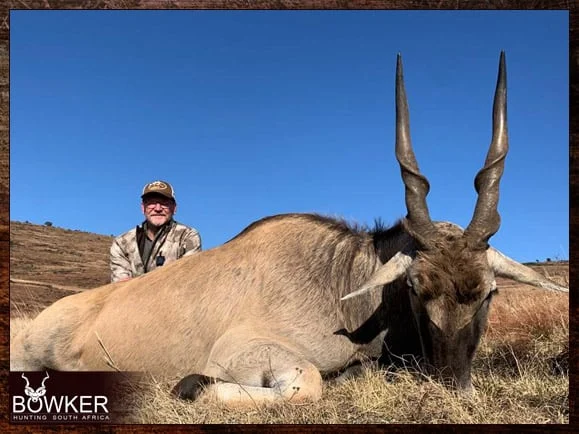
Limpopo
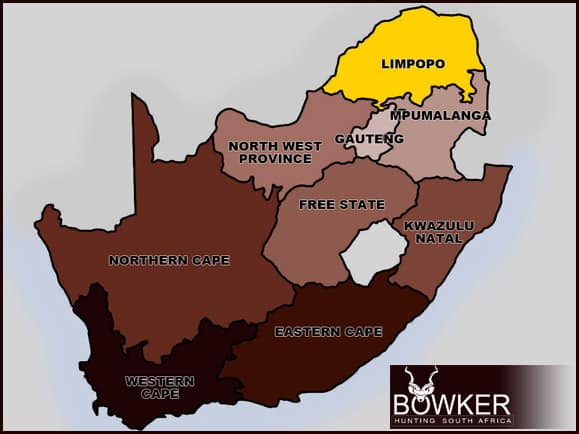
Landscape
The Limpopo province is in the far north of South Africa, and the Limpopo River demarcates much of the boundary between neighbours Botswana and Zimbabwe.
The highest number of outfitters are present in the Limpopo province, referred to as the bushveld. The terrain is generally wooded, thick, and flat but has mixed grassland and trees. During the rainy season, the vegetation is highly dense, making spotting the game challenging.
Limpopo hunting
The Limpopo province boasts a considerable amount of hunting area. High-fenced farms make up a significant amount of the hunting area in Limpopo.
Limpopo is probably the best area for bow hunters. The Limpopo area is best for hunting the big five and offers some unique species, such as hyenas, civet cats, and the honey badger.
The terrain results in much shorter shooting distances than the eastern cape. Often under 100 yards and trying to find a line through thick vegetation.
Getting to the Limpopo
Hunters will arrive at Johannesburg international airport (OR Tambo international). The outfitter will meet the hunter at the airport. Typically around a two to five-hour drive to the hunting concession.
Delta and United now have direct flights from the United States to Capetown, where you can catch a domestic flight.
Domestic internal flights are a possibility to shorten the drive.
Best game park viewing
Visit one of the many private game reserves to view the big five and receive five-star hospitality.
Free state
Landscape
The free state is in central South Africa and boasts many outfitters. High-lying flat grass plains make up the landscape. The grass plains stretch forever.
Good rainfall ensures a significant portion of the province is dedicated to growing corn. Sandstone hills called “koppies” in South Africa dot the grass plains.
Free state hunting
The free state has always been home to larger herds of springbok, black wildebeest, and blesbok. A wide variety of plains game and predator hunting is available.
Outstanding bird hunting is available in the free state. Facilitated by mile upon mile of corn fields. Bird hunting is some of the best anywhere and includes pigeons, doves, geese, waterfowls, francolin, and guineafowl.
Shooting distances tend to be longer and around two or three hundred yards.
Getting to the free state
Hunters will arrive at Johannesburg international airport (OR Tambo international). The outfitter will meet the hunter at the airport. Typically around a two to five-hour drive to the hunting concession. A short domestic flight to Bloemfontein of about 1 hour may be required to shorten the drive.
Delta and United now have direct flights from the United States to Capetown, where you can catch a domestic flight.
Best game park viewing
A visit to the golden gate national park.
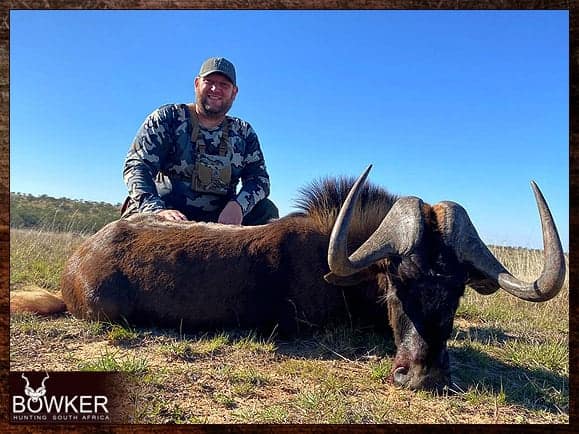
Northern Cape
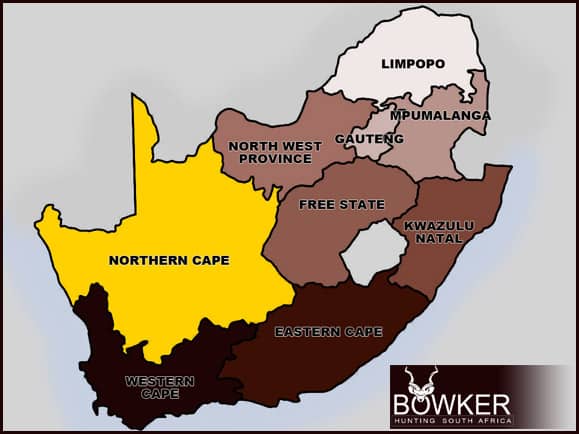
Landscape
The northern cape is arid and semi-desert. Due to the low carrying capacity, outfitters have vast tracts of land to hunt. South Africa’s largest province shares a boundary with Namibia.
The orange river demarcates the boundary. The terrain is flat, with rocky outcrops and red dunes. Flat-top acacia trees are abundant for shade while hunting in South Africa.
Northern cape hunting
The northern cape is the traditional home of the gemsbok and springbok, adapted to live off the dry arid land. Most plains game are available to hunt as well as the big five.
Some introduced species, such as the scimitar-horned oryx, blackbuck, and Barbery sheep, are available. Accompanying bushman tackers are considered the world’s best.
Shooting distances tend to be longer and around two or three hundred yards.
Getting to the Northern Cape
Hunters will typically arrive at Johannesburg international airport (OR Tambo international) and then take a short 1-hour domestic flight to Upington, where their outfitter will me them at the airport and drive them to their designated hunting area. Typically around a two-hour drive.
Delta and United now have direct flights from the United States to Capetown, where you can catch a domestic flight.
Best game park viewing
A visit to the Kalagadi national park on your South African hunting trip.
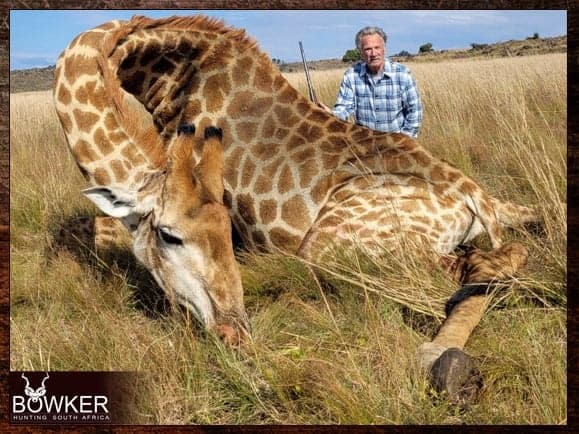
Gauteng
Landscape
Gauteng is by far the smallest and most densely populated province. Johannesburg International is in Gauteng. As a result, most hunters will pass through the province.
Johannesburg International is the gateway to much of Africa, and many hunters overnight there and catch a domestic flight the following day. Undulating hills and savannas fill the landscape.
Gauteng hunting
Not known for hunting, but outfitters are available. Classic plains game hunting in the Gauteng province is accessible.
Shooting distances vary significantly from 50 yards to 350 yards.
Getting to Gauteng
Hunters will arrive at Johannesburg international airport (OR Tambo international). The outfitter will meet the hunter at the airport.
Best game park viewing
A visit to one of many private game reserves on your South African hunting trip.
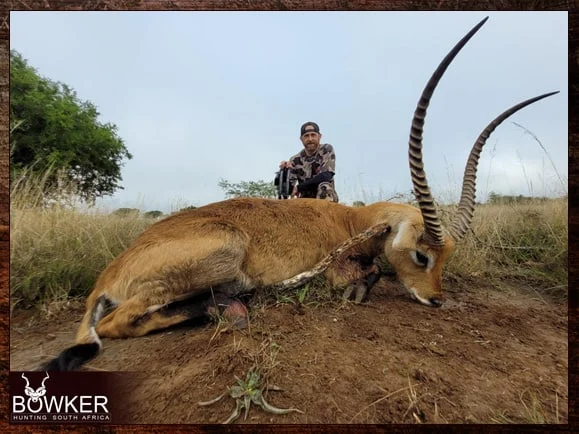
Mpumalanga
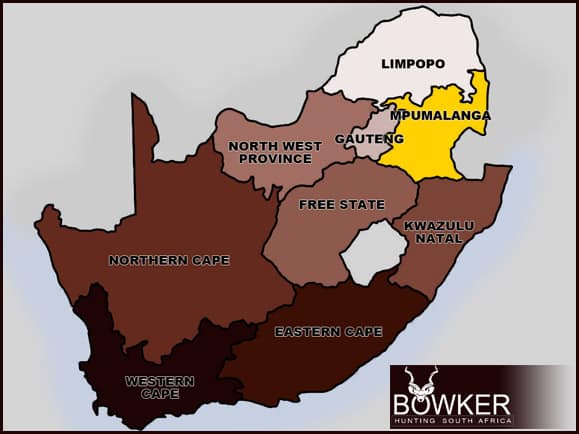
Landscape
Mpumulanga has a varied terrain divided between the Low plains or “Lowveld” and “highveld.”
As a result, Mpumalanga is a mixture of plains, mountains, rivers, and valleys. Considered a hunting mecca, numerous outfitters are available, often bordering on the iconic Kruger Park.
Mpumalanga hunting
Known for big five hunting, Mpumalanga carries all the plains game available for hunting in Africa.
Shooting distances, on the whole, will be 200 yards or less.
Getting to Mpumulanaga
Hunters will typically arrive at Johannesburg international airport (OR Tambo international) and then take a short 1-hour domestic flight to Nelspruit, where their outfitter will me them at the airport and drive them to their designated hunting area.
Best game park viewing
The Kruger park is South Africa’s largest game reserve and a national treasure.

Kwazulu-Natal

Landscape
KwaZulu Natal is on the country’s eastern side and borders the Indian ocean. Dense coastal forests and wetlands make up the coastal area. Inland the vegetation is predominantly grassland and savanna with rich green pastures, hills, and forests. Well known for hunting, with numerous outfitters available.
Kwazulu Natal hunting
Nyala used to be only available in the province but is now available across all provinces. The province has unique species, such as red duiker and Suni antelope.
The Hluhluwe – iMflozi park saved the white rhino, which can now be hunted in most provinces.
Shooting distances, on the whole, will be 200 yards or less.
Getting to Kwazulu Natal
Hunters will typically arrive at Johannesburg international airport (OR Tambo international) and then take a short 1-hour domestic flight to Durban, where their outfitter will me them at the airport and drive them to their designated hunting area.
Best game park viewing
A visit to the Hluhluwe – iMflozi game park.
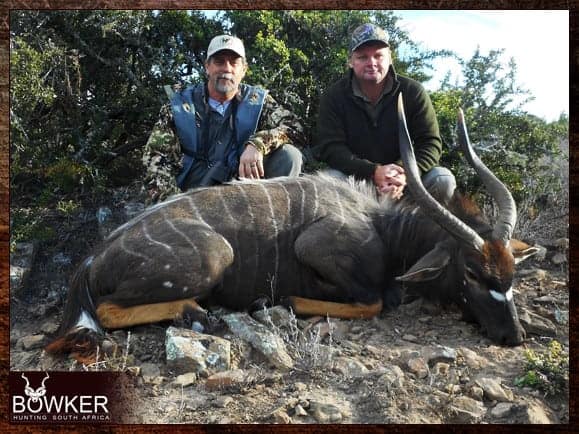
North West province
Landscape
The province occupies the flat interior high plains or “highveld,” Savana and rolling plains, and some bushveld; in particular, thorn trees dominate the landscape. Well known for game ranches that are scattered across the entire province
North West province hunting
Outfitters across the province offer nearly all available plains game species in South Africa. Some big five hunting is available.
Bow hunting in controlled ranches is also widely practiced targeting hunters from the United States. The area is well known for Tsessebe, which thrives in the North West.
Shooting distances vary from 50 yards to 300 yards.
Getting to the North West province
Hunters will typically arrive at Johannesburg International Airport (OR Tambo International) and then take a short 1-hour domestic flight to Mahikeng, where their outfitter will meet, drive them to thei,nd drive them to their designated hunting area and lodge within the North West province.
Best game park viewing
A visit to the Pilanesburh national park is well worth it.
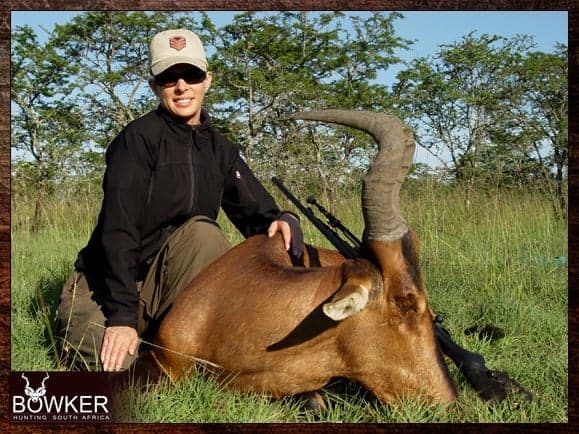
Western Province
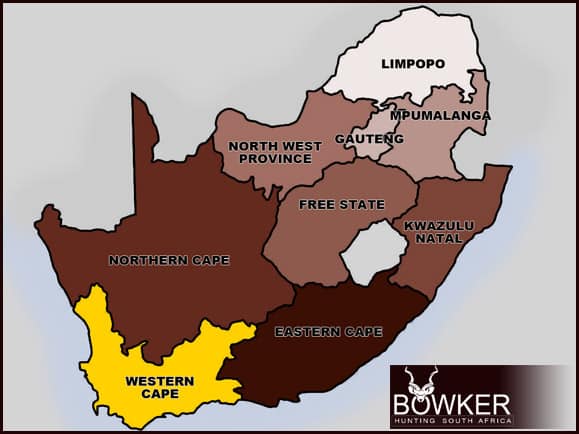
Landscape
On the Southern tip of South Africa, the Western Cape boasts a diverse landscape. Mountains, valleys, and beaches are evident. The interior is more flat and arid the closer you get to the Northern Cape. Hunting is available.
Western Cape hunting
Not known for hunting, but outfitters are available. Classic plains game hunting in the Western Cape province is accessible. Saved from extinction, the Bontebok originated in the Western Cape.
Getting to the Western Cape
Hunters will typically arrive at Johannesburg international airport (OR Tambo international) and then take a short 2-hour domestic flight to Capetown, where their outfitter will me them at the airport and drive them to their designated hunting area. Capetown is an international airport and hunters can fly direct to Cape town.
Best game park viewing
Consider a visit to Cape Town. Probably the top tourist attraction in South Africa.
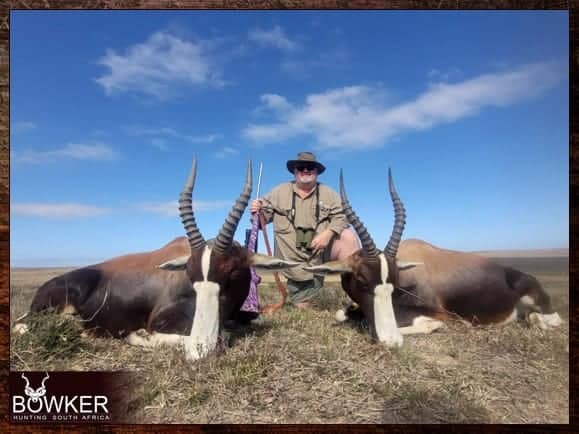
What animals can I Hunt in South Africa?
Plains Game List

Weather and temperature for hunting in South Africa
Eastern Cape weather and temperature
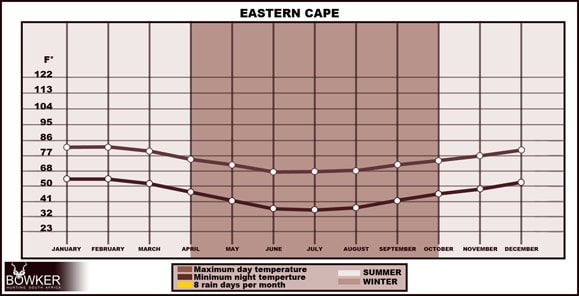
The Eastern Cape has a warm moderate climate. Most hunting will be inland rather than on the coastal belt. Rains fall inland predominantly in summer.
Daytime temperature is around 68°F in the winter months (June through August). During fall (March through May) and spring (September through November), temperatures will be slightly warmer at around 75°F.
Limpopo weather and temperature
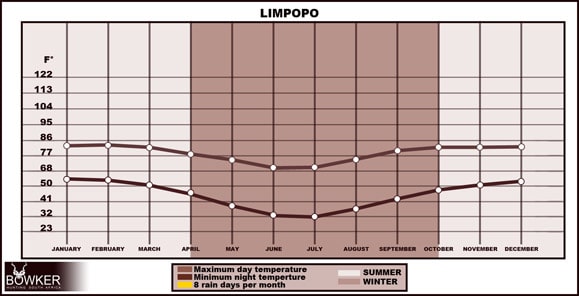
Limpopo hunters can expect plenty of sunshine. The tropic of Capricorn bisects the province. Rainfall is predominantly in the summer months.
Daytime temperature is around 68°F – 75°F in the winter months (June through August). During fall (March through May) and spring (September through November), temperatures will be warmer at around 75°F – 85°F.
Free State weather and temperature
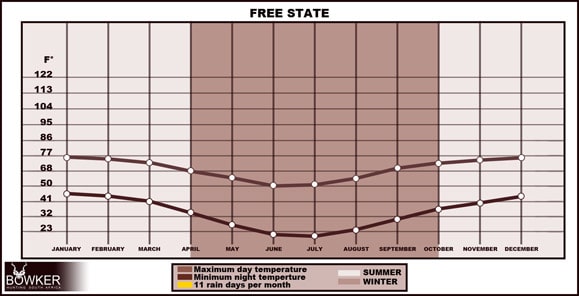
Free-state hunters can expect lots of sunshine but slightly colder days than in some other provinces. Rainfall is predominantly in the summer months.
Daytime temperature is around 50°F – 65°F in the winter months (June through August). During fall (March through May) and spring (September through November), temperatures will be warmer at around 67°F – 75°F.
Northern Cape weather and temperature
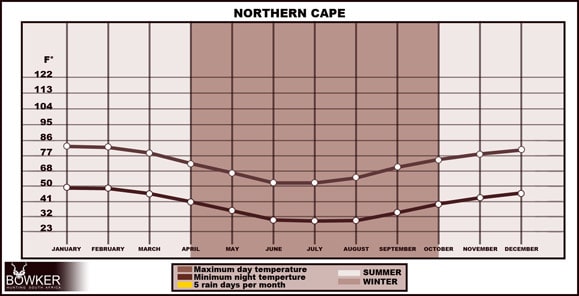
Northern Cape hunters will have the coldest days in winter and the warmest days in spring and fall due to the arid conditions. Rainfall is low.
Daytime temperature is around 50°F – 60°F in the winter months (June through August). During fall (March through May) and spring (September through November), temperatures will be warmer at around 67°F – 77°F.
Gauteng weather and temperature
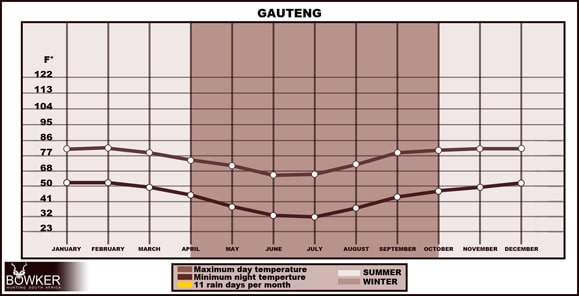
Gauteng hunters can expect plenty of sunshine and warm winter days. Rainfall is predominantly in the summer months.
Daytime temperature is around 68°F – 72°F in the winter months (June through August). During fall (March through May) and spring (September through November), temperatures will be warmer at around 75°F – 83°F.
Mpumalanga weather and temperature
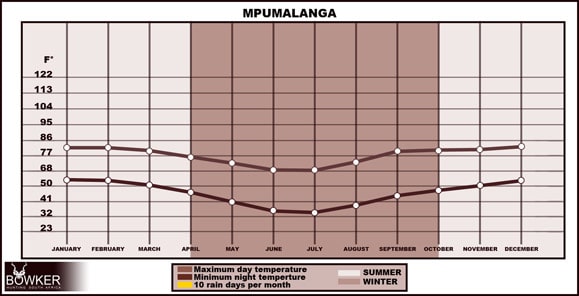
Mpumalanga hunters can expect plenty of sunshine and excellent weather conditions. Rainfall is predominantly in the summer months.
Daytime temperature is around 68°F – 75°F in the winter months (June through August). During fall (March through May) and spring (September through November), temperatures will be warmer at around 75°F – 80°F.
Kwazulu Natal weather and temperature
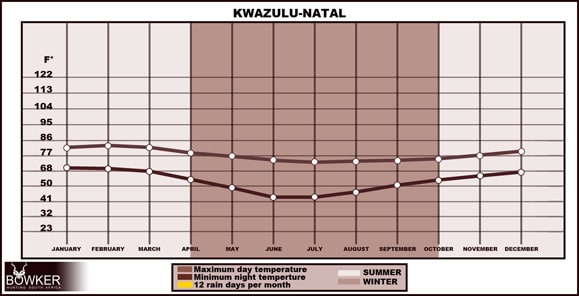
Kwazulu-Natal is the warmest province and at stages has a tropical feel. Rainfall is predominantly in the summer months.
Daytime temperature is around 74°F – 76°F in winter (June through August). During fall (March through May) and spring (September through November), temperatures will be warmer at around 77°F.
North West province weather and temperature
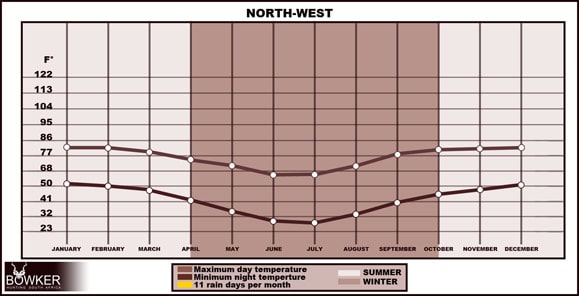
North West province hunters can expect plenty of sunshine and excellent weather conditions. Rainfall is predominantly in the summer months.
Daytime temperature is around 68°F – 75°F in the winter months (June through August). During fall (March through May) and spring (September through November), temperatures will be warmer at around 75°F – 80°F.
Western Cape weather and temperature
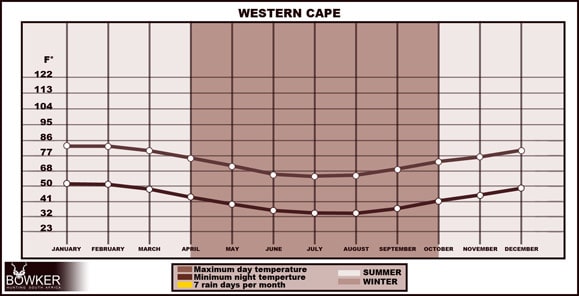
The Western Cape has a warm moderate climate. Most hunting will be inland rather than on the coastal belt. Rains fall inland predominantly in summer.
Daytime temperature is around 68°F the winter months (June through August). During fall (March through May) and spring (September through November), temperatures will be slightly warmer at around 75°F.
